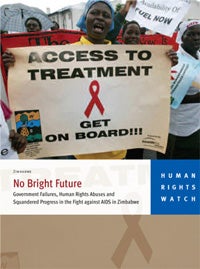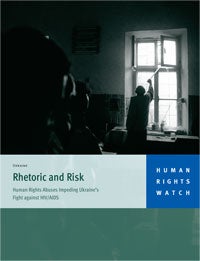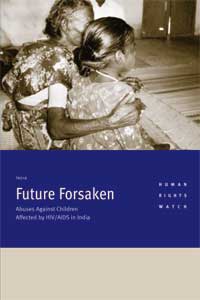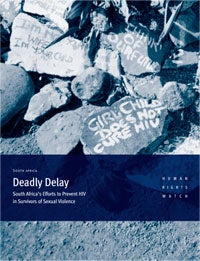 |
 |
 |
 |
Zimbabwe: July 2006 Human rights violations and inadequate health and social welfare policies are undermining progress in the fight against AIDS in Zimbabwe. Three thousand people die each week due to governmental policies that create formidable obstacles to accessing life-saving treatment. The prohibitively high costs of antiretroviral treatment and the government’s failure to inform HIV-positive individuals about the eligibility criteria for antiretroviral therapy have resulted in violations of people’s right to health. Women are among the most affected in Zimbabwe as they are often forced to engage in high-risk behaviors in order to survive and support their families, and are less able to independently find funds for treatment. After the government’s program of evictions in 2005, hundreds of people continue to live in appalling conditions, increasing the risk of HIV infection for thousands and further endangering the lives of those already infected. Zimbabwe, often hailed as a success story for a recent drop in HIV prevalence rates, continues to face an HIV/AIDS crisis that is driven by the government’s reluctance to implement equitable and non-discriminatory economic and social policies. “There’s no bright future because when you don’t know what you are going to eat tomorrow, there’s no future.” |
 |
“Rhetoric and Risk: Human Rights Abuses Impeding Ukraine's Fight Against HIV/AIDS" Ukraine: March 2006 Ukraine is home to the worst HIV/AIDS epidemic in Europe, and one of the fastest-growing epidemics in the world. The epidemic has been fuelled by harsh drug policies and routine police abuse against drug users – those hardest hit by HIV/AIDS – together with widespread discrimination by health care providers against drug users and people living with HIV/AIDS. Ukraine law and policy incorporates human rights protections – such as guarantees of the right to HIV/AIDS information, to confidentiality of HIV/AIDS test results, to free medical care for people living with HIV/AIDS – and progressive, evidence-based policies – such as syringe exchange and opiate substitution therapy. But these important government commitments have been systematically undermined by chronic human rights abuses by police and health care workers. Physical and psychological abuse by police of injection drug users and sex workers, and discriminatory and dehumanizing treatment by health care workers of drug users and people living with HIV/AIDS have kept many from receiving lifesaving HIV/AIDS information and services. Unless immediate and concerted action is taken, these human rights abuses could undo many of the important steps that Ukraine has taken to stop its HIV/AIDS epidemic. “I have been arrested before at this spot [the needle exchange point]. . . . There were syringes on the ground. A policeman came and picked up the syringe and said, ‘It’s yours,’ and charged me. . . . I am afraid to carry syringes because of police. Sometimes I avoid the needle exchange because of police.” |
 |
“Future Forsaken: Abuses against Children Affected by HIV/AIDS in India” India, July 2004 Hundreds of thousands of children in India are living with HIV/AIDS. Many more children are otherwise seriously affected by India’s burgeoning epidemic—when they are forced to withdraw from school to care for sick parents, are forced to work to replace their parents’ income, or are orphaned (losing one or both parents to AIDS). Yet HIV/AIDS-affected children, including those living with the disease, are nearly invisible in the Indian government’s policy response to the country’s devastating epidemic. Children affected by HIV/AIDS are being discriminated against in education and health services, denied care by orphanages, and pushed onto the streets and into the worst forms of child labor. Discrimination against girls makes them more vulnerable to HIV transmission and makes it more difficult for them to get care. Many children and the professionals who care for them are not getting the information about HIV they need to protect themselves or to combat discrimination. This report documents abuses against India’s HIV/AIDS-affected children and calls on the Indian government to recognize their plight and to take immediate action to protect them from discrimination and exploitation . “When I went to school, I sat separately from the other children, in the last mat. I sat alone. The other children wanted to be with me, but the teacher would tell them not to play with me. She said, ‘This disease will spread to you also, so do not play with her.” |
 |
“Deadly Delay: South Africa's Efforts to Prevent HIV in Survivors of Sexual Violence” South Africa: March 2004 Sexual violence against women and girls in South Africa has been a problem of epidemic proportions. In a nation with the highest reported rate of HIV/AIDS in the world, this violence could be a death sentence. In 2002, the South African government took the important step of pledging to provide rape survivors with the short, affordable course of antiretroviral drugs known as post-exposure prophylaxis (PEP). If administered promptly, PEP can reduce the risk of HIV transmission. In a 2004 investigation, Human Rights Watch found that while this effort was a crucial step toward protecting women from the consequences of sexual violence, the government’s failure to provide adequate information or training about PEP left rape survivors and service providers without basic information about PEP. PEP was generally unavailable outside major urban centers. By law, children under 14 could not consent to medical treatment; while provisions existed to obtain proxy consent in cases where no parent or guardian could be reached, many health care staff did not know or did not follow them. Inadequate police response to rape complaints, coupled with health professionals’ insistence that rape survivors file a police report in order to receive services, also undermined survivors’ access to services. In pledging to provide PEP, South Africa took an important stride in protecting rape survivors from HIV/AIDS. But without measures to ensure its availability, these commitments have been compromised. “The hospital superintendent was scared to give the antiretrovirals because he thought it was against government policy. He got a protocol, but he had no drive from the government to help staff the program. I had to convince the hospital superintendent to start providing PEP [post-exposure prophylaxis].” |
